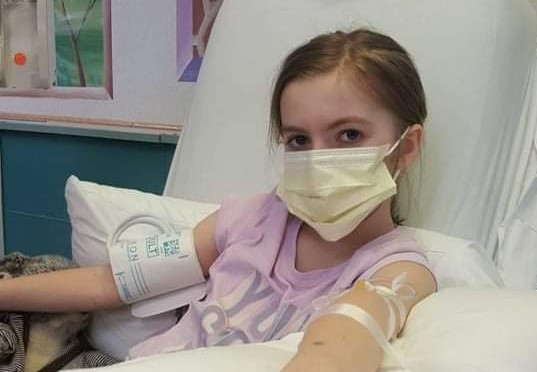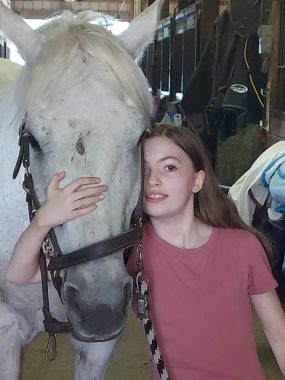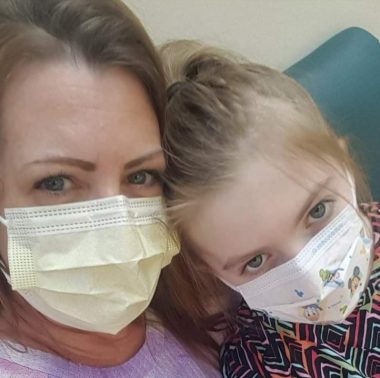11-year-old With aHUS Patiently Waiting for a Kidney
Written by |

Photo courtesy of Heather Sudol
Khloe Sudol receives her Ultomiris infusion at St. Christopher's Hospital for Children.
On the outside, Khloe Sudol seems like a normal 11-year-old. The quiet, reserved girl is full of energy, filling her time with horseback riding, swimming, and school work.
But on the inside, her kidneys have failed as a result of the ultra-rare disease atypical hemolytic uremic syndrome (aHUS), which causes blood clots to form in small blood vessels, harming internal organs, especially the kidneys.

11-year-old Khloe with her horse. (Photos courtesy of Heather Sudol)
Khloe requires peritoneal dialysis nightly and must make a two-hour drive up to St. Christopher’s Hospital for Children in Philadelphia from their home in Steelmantown, New Jersey, every eight weeks to receive an infusion of Ultomiris (ravulizumab-cwvz), one of the two treatments approved for managing aHUS. Khloe’s mother, Heather Sudol, said the therapy unfortunately could not reverse the damage done to her kidneys.
Having been on the transplant list for nine months and recently moved up to the first spot, Khloe, Heather, and their family are on the edge of their seats waiting for a kidney that could save Khloe’s life and free her from dialysis. In the past three months, St. Christopher’s started a live donation program, improving her chances of a kidney transplant. Even so, they’ve had only one call, but the kidney wasn’t a match.
Sudol, in a phone interview with aHUS News, implored people to sign up to donate their kidneys, not just for Khloe but also for other patients who need them. According to a 2018 editorial published in the Journal of the American Society of Nephrology, of the approximately 126,000 patients diagnosed each year in the U.S. with end-stage kidney disease, only 16% receive a transplant.
“We need people out there willing to donate,” said Sudol, 42. “You can live with one kidney the rest of your life and be perfectly healthy and live a normal life. God gave us two.”
Khloe’s story has already gained a national audience. She was featured on “Fox and Friends” and a handful of local news channels. For her 10th birthday, a caravan of cars drove past her home, including a host of Disney characters who showed up because her Make-a-Wish trip to Walt Disney World was canceled due to COVID-19.
The attention was overwhelming at first as gifts kept arriving at the front door, but more than 20 people have signed up so far with the intent to donate a kidney because of the media coverage surrounding Khloe.
She won the American Kidney Fund’s 2021 Calendar Kids Art Contest with a painting about kidneys growing like flowers. Her art is featured on this year’s cover of the organization’s calendar and the prize included a $500 Visa gift card and $100 Amazon gift card.
“I was very vocal about her diagnosis and very open about it,” Sudol said, sparing no detail on the strain aHUS put on Khloe and the rest of the family. “I guess it just got to people. They wanted to follow her.”
Even though Sudol has found multiple people willing to donate, the difficult part is trying to find the right match. A donor must be older than 18, extremely healthy, and the appropriate weight and height because Khloe is a small 11-year-old. Their blood type has to be either A-positive or O.
Finding someone who checks all the boxes isn’t easy, but the Sudols are holding out hope they’ll find a match. People interested in potentially donating a kidney to Khloe are asked to contact the family at 609-408-0028.

Khloe and her mother, Heather Sudol, wait for an infusion.
It was in November 2019, when Khloe was 9, that aHUS symptoms started. She was sick for nine days with bouts of coughing and an incessant headache, which led to a fever. Sudol sent Khloe to the urgent care twice, where a physician there said it was a sinus infection.
On Thanksgiving morning, Khloe woke up at 4 a.m., vomiting. Things were not getting any better so Sudol drove her to the St. Christopher’s emergency room, where staff conducted urinalysis and blood work over a period of four hours.
She eventually was unable to go to the bathroom and had severe back pain; micro-clotting had occurred, and her kidneys were shutting down. A later biopsy showed that her kidneys, according to Sudol, were “completely destroyed.” After more tests, the aHUS diagnosis was confirmed, and Khloe immediately was started on Soliris (eculizumab), the first therapy approved to treat aHUS, which required an infusion every two weeks.
Additionally, before starting peritoneal dialysis — an at-home procedure that filters and removes waste products from the blood through the lining of the abdomen (peritoneum) — Khloe needed to undergo hemodialysis, which requires a dialysis machine to clean the blood, three times a week at the hospital, which was nearly 70 miles away. Now, with the new treatment, that trip is necessary only once every eight weeks.
Meanwhile, Khloe and her family are making the best of a tough situation. Sudol said Khloe has adapted well to life with aHUS, but misses swimming in public pools and lakes, and sleepovers with her friends. And now, with the possibility of a kidney transplant looming on the horizon, she’s anxious about the procedure.
“The last couple of nights I’ve been having to sit down with her and talk about what’s going to be happening and why she’s scared,” Sudol said, adding that they’ve listed the pros and cons of having a transplant in an effort to surmount that anxiety.
She’s trying to encourage Khloe to view it as the next treatment to manage aHUS. It would free her from the nightly dialysis tubes. But, with or without a new kidney, Khloe refuses to let aHUS define her.
“Her kidney disease really hasn’t knocked her down. She just keeps going,” Sudol said.





